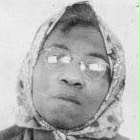
1900 - 1945
Lena Baker
Summary
Name:
Years Active:
1944Birth:
June 08, 1900Status:
ExecutedClass:
MurdererVictims:
1Method:
ShootingDeath:
March 05, 1945Nationality:
USA
1900 - 1945
Lena Baker
Summary: Murderer
Name:
Lena BakerStatus:
ExecutedVictims:
1Method:
ShootingNationality:
USABirth:
June 08, 1900Death:
March 05, 1945Years Active:
1944Date Convicted:
August 14, 1944bio
Lena Baker was born on June 8, 1900, in Cuthbert, Randolph County, Georgia, to a poor African American sharecropping family. She was one of four children and grew up in a community defined by poverty and the racial segregation laws of the Jim Crow South. Her family worked on farms, and as a child, Lena joined them in the cotton fields, laboring long hours for white landowners in exchange for meager pay and food.
As a young woman, Baker moved to the small town of Cuthbert, where she worked as a domestic servant. She later became a mother of three children and continued to work as a maid to provide for her family. Life for Black women in Georgia during the 1930s and 1940s was marked by systemic racial discrimination, sexual exploitation, and violence—conditions that formed the backdrop to Baker’s own struggles.
By the early 1940s, Lena’s life was shaped by both poverty and racial subjugation. In 1944, she began working as a caretaker for an older white man named Ernest Knight, who owned a gristmill. The working relationship soon turned abusive. According to later reports and witness accounts, Knight sexually assaulted and imprisoned Baker for days at a time, forcing her into a state of virtual slavery. Locals described her as a “slave woman” held under Knight’s control. Despite repeated abuse, Lena continued to work for him out of fear and necessity, as her options for escape or legal recourse were extremely limited under Georgia’s racially biased justice system.
murder story
On April 29, 1944, Lena Baker’s long ordeal reached a fatal conclusion. That night, she went to Ernest Knight’s gristmill, where an argument broke out between them. According to Baker’s later testimony, Knight threatened her with an iron bar when she tried to leave. As she attempted to escape, a violent struggle ensued over his pistol. During the altercation, the gun discharged, striking and killing Knight. Immediately afterward, Lena fled the scene and reported the incident, telling authorities she had acted in self-defense after years of abuse and imprisonment.
Despite her cooperation with law enforcement, Baker was arrested and charged with capital murder. Her trial began on August 14, 1944, before an all-white, all-male jury—a common practice in segregated Georgia, where Black citizens were disenfranchised and excluded from jury service. The presiding judge, William “Two Gun” Worrill, was known for keeping two pistols on the bench.
During the trial, Baker gave a detailed testimony describing years of violence at Knight’s hands. She recounted how he held her captive, assaulted her, and threatened to kill her if she attempted to leave. The prosecution, however, portrayed her as a volatile woman engaged in an illicit relationship with a white man, ignoring her claims of self-defense and coercion. After just one day of testimony and deliberation, the jury found Lena Baker guilty of capital murder, and she was sentenced to death by electrocution.
Governor Ellis Arnall granted a temporary 60-day reprieve to allow the Georgia Board of Pardons and Parole to review her case. In January 1945, the board denied clemency. On February 23, 1945, Baker was transferred to Georgia State Prison in Reidsville. She remained there for less than two weeks before her scheduled execution.
On March 5, 1945, at age 44, Lena Baker was executed in the electric chair. She was the only woman ever executed by electrocution in the state of Georgia. Witnesses recorded her final words as calm, dignified, and full of faith—she maintained to the end that she had acted to save her own life. Baker was buried in an unmarked grave behind Mount Vernon Baptist Church in Cuthbert, where she had once sung in the choir.